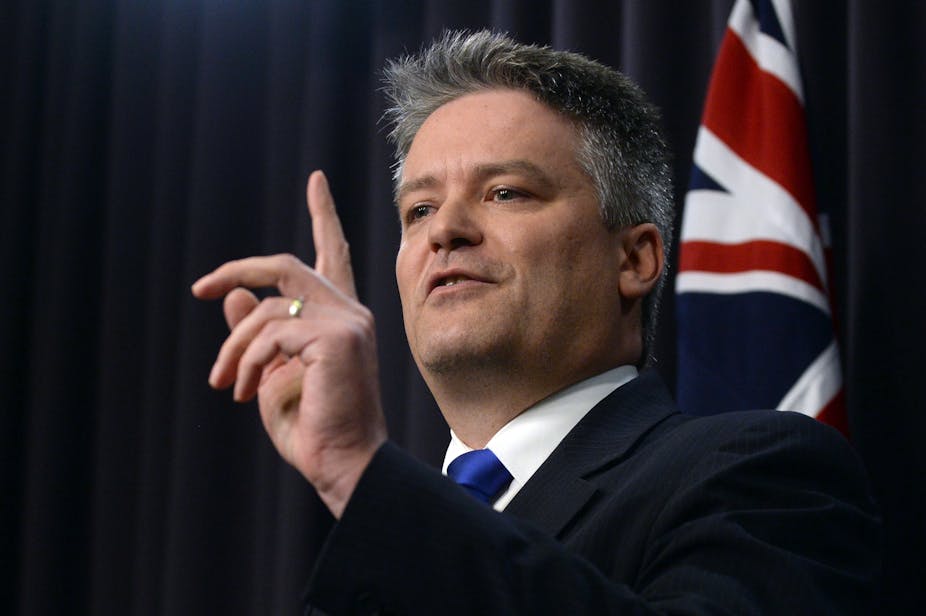As if it doesn’t have enough trouble with its budget, the government is now bracing for another attempt at selling its plans to water down Labor’s Future of Financial Advice (FoFA) law.
Finance Minister Mathias Cormann - who “paused” the Coalition’s proposed changes for further consultations after Arthur Sinodinos was forced to stand aside as Assistant Treasurer - has this morning released a limited compromise.
The one area where the government has moved to reassure consumers is in relation to commissions and “conflicted remuneration”.
The government insists that it never meant to lift the ban on commissions to those – notably bank employees – giving general advice. (These employees would be able to get bonuses and incentive payments that were not considered “conflicted remuneration”).
Rather amusingly, given its general attitude to the public broadcaster, Cormann invokes an ABC “fact check” to reinforce the government’s credentials on being against commissions.
But a Senate inquiry into its legislation, which reported this week, found it was not clear enough - Coalition senators recommended redrafting.
Cormann now says the government will move to put the position “absolutely beyond doubt by prescribing that any payment related to the provision of general advice cannot be an upfront or trailing commission”.
There will be an explicit prohibition on “any payment made solely because a financial product of a class in relation to which the general advice was given has been issued or sold to the client”. Also expressly prohibited will be “any recurring payment made because the person has given the general advice”.
To try to convince people that it is fair dinkum, Cormann says there will be power for the government to intervene by regulation if a situation makes it necessary (which he doesn’t think will arise).
“If – contrary to our clear expectation and our intention not to bring back conflicted remuneration – developments in the market warrant our intervention, we could and would address the issue very quickly through regulations.”
Cormann argues that these guarantees against commissions go further than the Senate inquiry’s recommendations.
But on its proposed change to the FoFA provisions to ensure an adviser acts in the client’s “best interest”, the government is standing firm.
The Labor law lays out various steps for advisers to show they have satisfied this duty, including a catch-all one saying that an adviser should also take any other reasonable steps.
The government insists this is too open-ended, creating uncertainty, and plans to scrap it.
But the Senate majority said it should look at “whether any further strengthening is required to ensure a provider cannot circumvent these best interests obligations”.
Cormann says the government has been open to suggestions on what other specific requirements might improve the test. “However, when asked, even the most vocal critics of the government’s proposed change to the best interest duty test have not been able to point to one.” So nothing will be added to the scaled-back test.
The best interest test has been a sensitive point, and the decision not to enhance it is very likely to be provocative.
The government intends to bring in some of its changes by regulations so they can operate between July 1 and the end of the year by when, it hopes, the legislation would be through.
These regulation would include removing the “opt in” provision under which investors have to renew regularly their relationship with advisers; abolishing the catch-all provision for the best interest test, and scrapping the requirement for fee-disclosure statements to be sent to pre-July 1 2013 clients. The tighter provisions to ensure that commissions cannot be reintroduced will also come in by regulation.
These regulations can be disallowed by the Senate.
While the government argues that Labor’s law involves too much cost and red tape, it has been considerably motivated by its concern that the industry super funds are advantaged. Sinodinos in particular was sympathetic to the banks’ push to tilt things more their way.
But the timing could not be worse for the government.
Today’s decision has been rushed out ahead of another Senate report, tabled next week, which will be very critical of how the Commonwealth Bank handled compensation for people who fell victim of financial advisers associated with it.
If the reassurance offered in its compromise does not satisfy in particular senior groups worried about older people being ripped off, as well as other consumer advocates, the government will have another damaging stoush on its hands – and could lose the measures in the Senate anyway.
Anything to do with people’s savings and retirement income touches not just their hip pocket nerve but also stirs some of their deepest fears. Financial crashes leading to families losing their life savings, with heart-rending footage on television, are embedded in the public mind.
With its budget measures the government is stripping back benefits and increasing the price of services; with the changes to FoFA, the issue is what will happen to the protections for the increasing number of small investors seeking to make best use of their retirement or other funds.
On both fronts, the government has found itself in a bad place politically because it has made ordinary people feel more vulnerable.
Listen to Mathias Cormann talk in depth about the FoFA changes on the Politics with Michelle Grattan podcast here.

